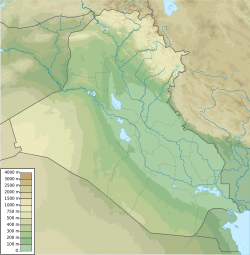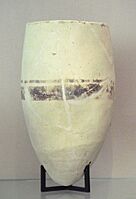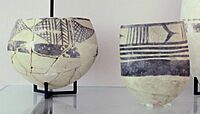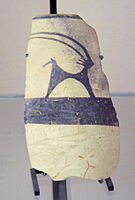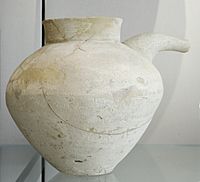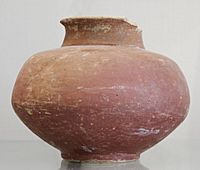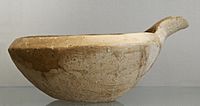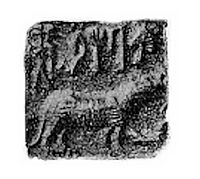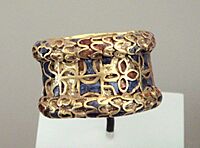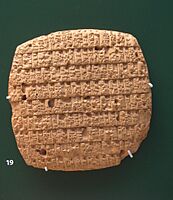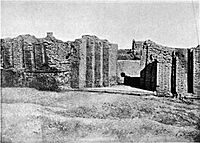Girsu facts for kids
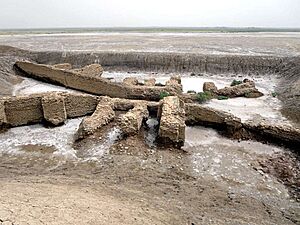
Archaeological remains of constructions at Tello/Girsu
|
|
| Alternative name | Tell Telloh |
|---|---|
| Location | Dhi Qar Province, Iraq |
| Region | Sumer |
| Coordinates | 31°33′43.3″N 46°10′39.3″E / 31.562028°N 46.177583°E |
| Type | Settlement |
| History | |
| Periods | Early Dynastic, Ur III |
| Site notes | |
| Excavation dates | 1929–1933, 2017 |
| Archaeologists | Henri de Genouillac, André Parrot |
Girsu (Sumerian Ĝirsu; cuneiform ĝir2-suki 𒄈𒋢𒆠) was a city of ancient Sumer, situated some 25 km (16 mi) northwest of Lagash, at the site of what is now Tell Telloh in Dhi Qar Governorate, Iraq.
Contents
History
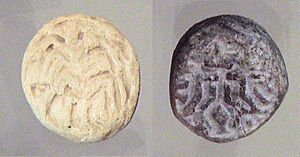
Girsu was possibly inhabited in the Ubaid period (5300-4800 BC), but significant levels of activity began in the Early Dynastic period (2900-2335 BC). At the time of Gudea, during the Second Dynasty of Lagash, Girsu became the capital of the Lagash kingdom and continued to be its religious center after political power had shifted to the city of Lagash. During the Ur III period, Girsu was a major administrative center for the empire. After the fall of Ur, Girsu declined in importance, but remained inhabited until c. 200 BC. A 4th century BC bilingual Greek/Aramaic inscription was found there.
Archaeology
The site consists of two main mounds, one rising 50 feet above the plain and the other 56 feet. A number of small mounds dot the site. Telloh was the first Sumerian site to be extensively excavated, at first under the French vice-consul at Basra, Ernest de Sarzec, in eleven campaigns between 1877 and 1900, followed by his successor Gaston Cros from 1903–1909. Finds included an alabaster statue of a woman, with copper bracelets coated in gold and a fragment of a stone lion carved dish with a partial Sumerian inscription. In 1879 the site was visited by Hormuzd Rassam.
Excavations continued under Abbé Henri de Genouillac in 1929–1931 and under André Parrot in 1931–1933. It was at Girsu that the fragments of the Stele of the Vultures were found. The site has suffered from poor excavation standards and also from illegal excavations. About 50,000 cuneiform tablets have been recovered from the site.
Excavations at Telloh resumed in 2016 as part of a training program for Iraqi archaeologists organized by the British Museum. A foundation tablet and a number of inscribed building cones have been found. In the 5th season, in autumn 2019, work concentrated on the Mound of the Palace where E-ninnu, a temple to Ningirsu, had been found in earlier seasons. In March 2020, archaeologists announced the discovery of a 5,000-year-old cultic area filled with more than 300 broken ceremonial ceramic cups, bowls, jars, animal sacrifices, and ritual processions dedicated to Ningirsu. One of the remains was a duck-shaped bronze figurine with eyes made from bark which is thought to be dedicated to Nanshe. An Indus Valley weight was also found. In February 2023, archaeologists from British Museum and Getty Museum revealed the remains of the 4,500 year-old Sumerian Lord Palace of the Kings alongside more than 200 cuneiform tablets containing administrative records of Girsu. The E-ninnu temple (Temple of the White Thunderbird), the primary sanctuary of the Sumerian warrior god Ningirsu was also identified during the excavations.
In 2023, British Museum experts have suggested the possibility that a Greek temple at Girsu was founded by Alexander the Great. According to the researchers, recent discoveries suggest that "this site honours Zeus and two divine sons. The sons are Heracles and Alexander."
Gallery
Ubaid IV artifacts (4700–4200 BC) in Girsu
Uruk Period artifacts (4000–3100)
-
Uruk period vase. Terracotta, ca. 3500–2900 BC. From Telloh, ancient city of Girsu. Louvre Museum.
-
Vase. Terracotta with red slip, ca. 3500–2900 BC. From Telloh, ancient city of Girsu. Louvre Museum.
Early dynastic artifacts in Girsu (3rd millennium BC)
-
An account of barley rations issued monthly to adults and children written in Cuneiform on clay tablet, written in year 4 of King Urukagina (c. 2350 BC). From Girsu, Iraq. British Museum, London.
-
Telloh doorway erected by Gudea (c. 2100 BC)
See also
- Gudea cylinders
- Ningirsu
- Statues of Gudea
- Cities of the ancient Near East


